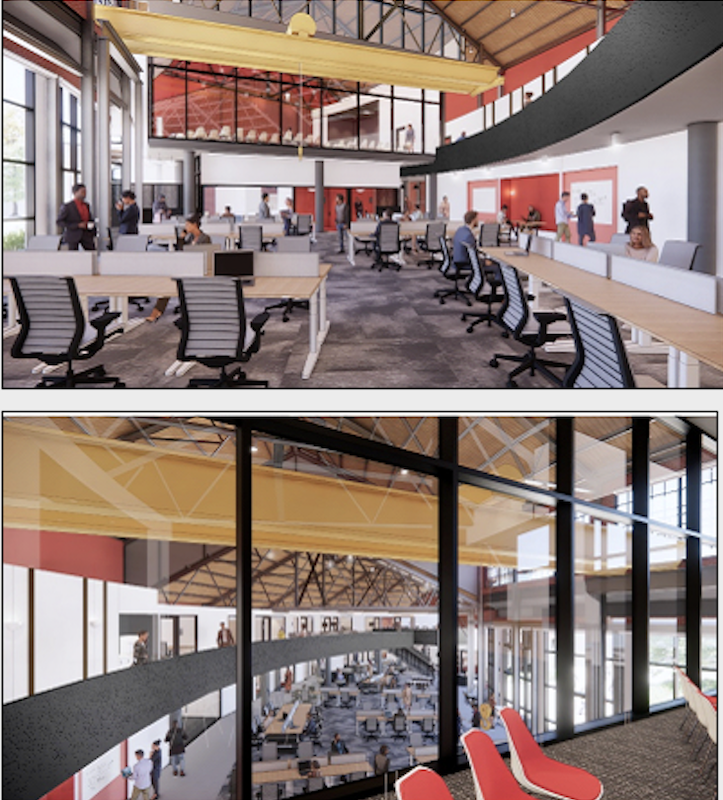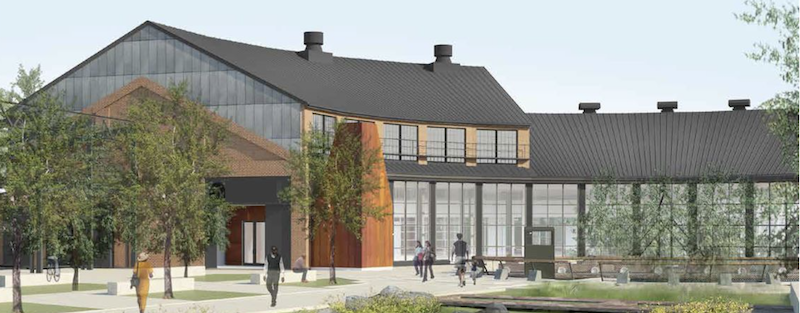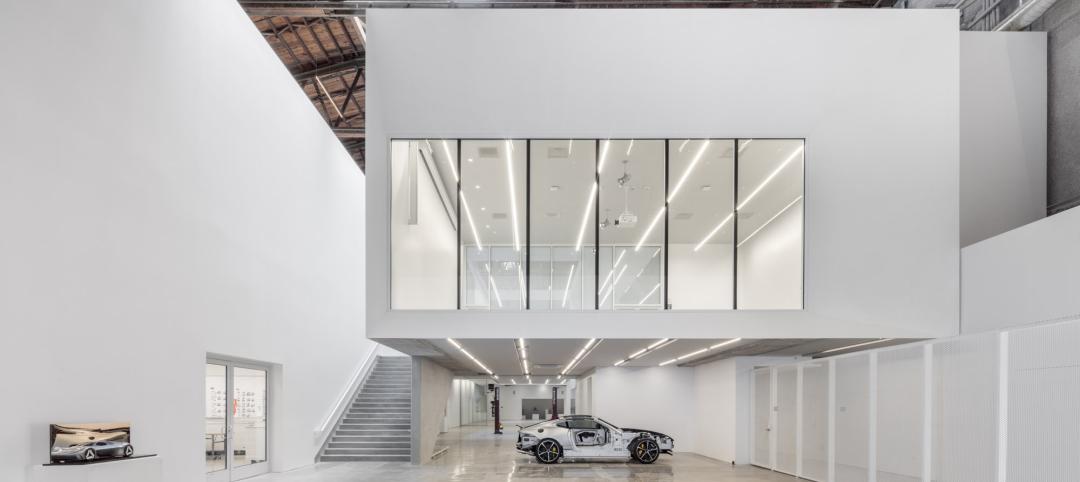A progress report on Hazelwood Green, the 178-acre redevelopment project in Pittsburgh, finds its current stage focusing on exterior amenities.
The redevelopment team led by Almono LP—an investment partnership of the Richard King Mellon Foundation, the Heinz Endowments, and the Benedum Foundation—has designed, funded, and completed a two-acre Plaza north of Mill 19, the quarter-mile-long skeleton of a former steel mill that sits on 12.6 acres of Hazelwood Green’s riverfront acres and, in its post-industrial reincarnation, offers 264,000 sf of rentable space to 21st-Century oriented manufacturing and automation tenants.
The plaza will serve as the civic heart of Hazelwood Green. It includes gardens, lawns, trees, and native vegetation, as well as a solar canopy, a tiered water feature, and hardscape surfaces for events and other uses. (Almono has engaged a team led by the urban planning firm Street Plans to devise and execute the plaza’s programming.)
Almono is also working with the Pittsburgh Parks Conservancy on placing a tree nursery on-site. That nursery would include tree species that mitigate air pollution, and a meadow with seating options.
In concert with agencies that include the Pennsylvania Environmental Council, Almono is working on a master plan to improve accessibility to a 1.2-mile stretch along the riverfront. Also in the works are several mobility initiatives that include coordination with Pittsburgh’s Office of Public Art to engage local designers and fabricators to add eight bus shelters to the site. (RFP responses are due next month, with the goal of installing the shelters later next year.)
Almono and the city want to add curbside charging stations for electric vehicles, and Almono has entered into an agreement with Healthy Ride to install a bikeshare station at the plaza by next spring.
A NEW PLATFORM FOR ENTREPRENEURS

The Roundhouse's interior will have ample collaborative spaces for entrepreneurs.
The Hazelwood Green redevelopment is also proceeding with the adaptive reuse of existing buildings on-site. This spring should see the completion of the reconstruction of the Roundhouse, which dates back to the late 1880s, and once was used to stabilize train engines for servicing. This building is getting a $12.5 million rehabilitation and will re-emerge as the 26,000-sf home to an innovation center for OneValley, a global entrepreneurship platform formerly known as GSVlabs.
“The Roundhouse communicates its industrial origins, and when you are in the space, you recognize that it carries with it the memory and residue of over 100 years of 20th-Century activity and life,” says Anne Chen, principal with GBBN, this project’s architect and interior designer. “The design vision for this remarkable building has focused on connecting to its important role in Pittsburgh history while repositioning the space to usher in a new future of community enrichment, technology, manufacturing and entrepreneurialism.”
Other firms on the Roundhouse project team include WBCM (SE), Buro Happold (MEP), LaQuatra Bonco (landscape architect), KU Resources (CE), evolveRA (LEED management), PJ Dick (CM), and Grand View Development (owner’s rep). U3 Advisors, the development advisor for Hazelwood Green, has also been involved in the Roundhouse remake.
The Roundhouse’s original turntable surface is being repurposed to function as an outdoor relaxation space with wheeled seating on the rails. The building’s original bridge crane was recently rehung in the space. Overhead engine bay doors are being replaced with a glass curtainwall system to bring natural light into the building.
BIG PLANS OVER THE NEXT TWO DECADES
Local small manufacturers and artisans, working with the custom fabricator Monmade, have been engaged to design elements of the Roundhouse that include signage, interior lighting, wall tile, custom benches, and sliding doors.
Almono is seeking LEED Gold certification for the Roundhouse, whose stormwater management includes the use of bioswales and a large rain garden to keep and filter water on site.
Over the next two decades, Hazelwood Green’s redevelopment plan calls for 31 acres of open public space, 3,500 housing units, and 4.4 million sf of commercial building space.
Related Stories
Education Facilities | Aug 4, 2024
A former supersonic wind tunnel becomes a new educational facility for transportation design
The Mullin Transportation Design Center at ArtCenter College of Design in Pasadena, Calif., provides access for full-scale vehicular models, replicating a professional design studio.
Adaptive Reuse | Jul 30, 2024
Empty mall to be converted to UCLA Research Park
UCLA recently acquired a former mall that it will convert into the UCLA Research Park that will house the California Institute for Immunology and Immunotherapy at UCLA and the UCLA Center for Quantum Science and Engineering, as well as programs across other disciplines. The 700,000-sf property, formerly the Westside Pavilion shopping mall, is two miles from the university’s main Westwood campus. Google, which previously leased part of the property, helped enable and support UCLA’s acquisition.
Great Solutions | Jul 23, 2024
41 Great Solutions for architects, engineers, and contractors
AI ChatBots, ambient computing, floating MRIs, low-carbon cement, sunshine on demand, next-generation top-down construction. These and 35 other innovations make up our 2024 Great Solutions Report, which highlights fresh ideas and innovations from leading architecture, engineering, and construction firms.
Adaptive Reuse | Jul 12, 2024
Detroit’s Michigan Central Station, centerpiece of innovation hub, opens
The recently opened Michigan Central Station in Detroit is the centerpiece of a 30-acre technology and cultural hub that will include development of urban transportation solutions. The six-year adaptive reuse project of the 640,000 sf historic station, created by the same architect as New York’s Grand Central Station, is the latest sign of a reinvigorating Detroit.
MFPRO+ News | Jun 24, 2024
‘Yes in God’s Backyard’ movement could create more affordable housing
The so-called “Yes in God’s Backyard” (YIGBY) movement, where houses of worship convert their properties to housing, could help alleviate the serious housing crisis affecting many communities around the country.
Multifamily Housing | Jun 14, 2024
AEC inspections are the key to financially viable office to residential adaptive reuse projects
About a year ago our industry was abuzz with an idea that seemed like a one-shot miracle cure for both the shockingly high rate of office vacancies and the worsening housing shortage. The seemingly simple idea of converting empty office buildings to multifamily residential seemed like an easy and elegant solution. However, in the intervening months we’ve seen only a handful of these conversions, despite near universal enthusiasm for the concept.
Adaptive Reuse | Jun 13, 2024
4 ways to transform old buildings into modern assets
As cities grow, their office inventories remain largely stagnant. Yet despite changes to the market—including the impact of hybrid work—opportunities still exist. Enter: “Midlife Metamorphosis.”
Adaptive Reuse | Jun 6, 2024
Latest phase of London redevelopment completes two new buildings
Developers are creating a neighborhood for 25,000 residents and workers.
MFPRO+ News | Jun 3, 2024
New York’s office to residential conversion program draws interest from 64 owners
New York City’s Office Conversion Accelerator Program has been contacted by the owners of 64 commercial buildings interested in converting their properties to residential use.
Adaptive Reuse | May 15, 2024
Modular adaptive reuse of parking structure grants future flexibility
The shift away from excessive parking requirements aligns with a broader movement, encouraging development of more sustainable and affordable housing.

















